Why Smart Funeral Homes Choose Used Equipment Over New
Used funeral equipment offers funeral directors a practical path to high-quality mortuary gear without breaking the budget. Whether you're starting a new funeral home or upgrading existing facilities, the used equipment market provides substantial savings while maintaining professional standards.
Quick Answer: Where to Find Used Funeral Equipment
- Online marketplaces: eBay, Facebook groups, Machinio
- Savings potential: 25-40% off retail prices
- Top categories: Embalming tables ($5,000-$6,500 vs $6,500-$6,995 new), mortuary cots ($1,695-$2,889 vs $3,500-$4,900 new), refrigeration units ($4,500-$9,000 vs $8,000-$15,000 new)
- Key buyers: Startup funeral homes, rural operations, mortuary schools
- Must inspect: Load capacity, 304 stainless steel grade, hydraulic systems, electrical certifications
The numbers tell a compelling story. Used mortuary refrigeration units can save you 35-45% compared to new models, while cremains processors offer 42% savings at $5,500 versus $9,500 for new equipment. Many funeral homes slash their startup costs by 30-40% by choosing quality used equipment over new purchases.
The steepest depreciation happens in the first year - typically 20-30% - then levels off to 5-10% annually. This creates opportunities for smart buyers who understand equipment lifecycles and know what to look for during inspections.
I'm Mortuary Cooler from American Mortuary Coolers, and I've helped funeral directors nationwide steer the used funeral equipment marketplace for over a decade. My experience sourcing and evaluating pre-owned mortuary gear has shown me that the right used equipment can deliver the same reliability as new models at a fraction of the cost.
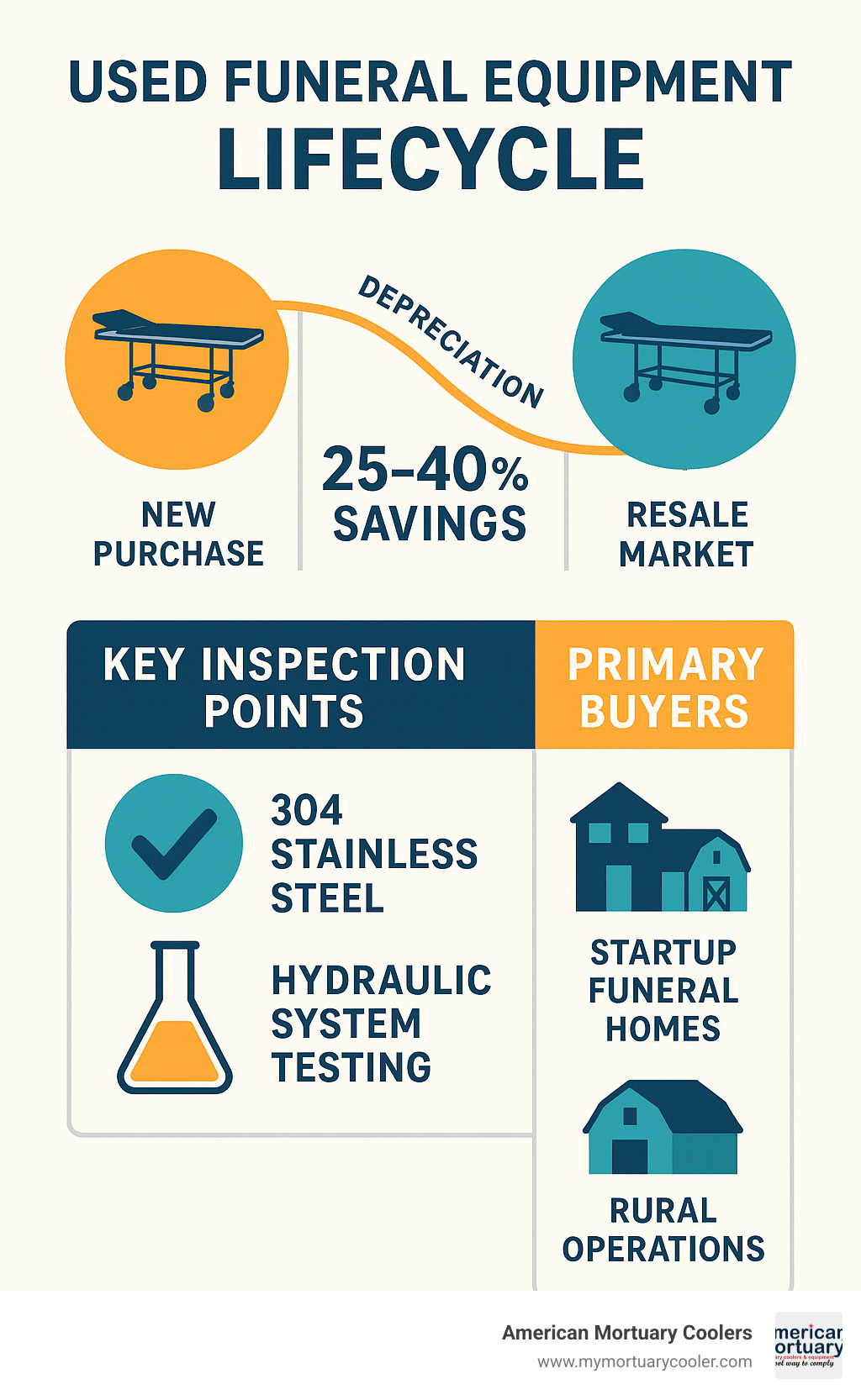
Why This Guide Matters
Starting a funeral home or expanding existing operations requires significant capital investment. With startup costs often exceeding $100,000 for basic equipment alone, the used funeral equipment market provides a lifeline for budget-conscious funeral directors. Beyond immediate savings, purchasing pre-owned equipment supports environmental sustainability by extending product lifecycles and reducing manufacturing demand.
Compliance remains critical regardless of whether you buy new or used. Every piece of mortuary equipment must meet OSHA safety standards, state embalming room codes, and EPA disposal requirements. We'll walk you through the regulatory checklist to ensure your used purchases maintain professional standards while delivering cost savings.
Finding Value in Used Funeral Equipment: Market Snapshot
The used funeral equipment market operates on some pretty predictable patterns, which is great news if you know what to look for. Most mortuary equipment takes its biggest financial hit in that first year - we're talking about 20-30% depreciation right off the bat. After that initial drop, things settle down to a more reasonable 5-10% per year before the value stabilizes around the 5-7 year mark.
This depreciation curve creates what I like to call "sweet spots" - those perfect moments when you can snag quality equipment that's past its steepest value drop but still has plenty of reliable service life ahead.
The supply side keeps things interesting year-round. Equipment flows into the market from funeral home closures, facility upgrades, equipment leasing returns, and manufacturer trade-ins. You'll notice seasonal peaks during spring and fall when many facilities tackle their renovation projects, but opportunities exist throughout the year.
How Much Can You Save on Used Funeral Equipment?
Let me break down the real numbers I've seen across the major equipment categories, because the savings can be pretty eye-opening.
Embalming tables represent one of the more conservative savings categories, but they're still worthwhile. Those hydraulic models that retail for $6,500-$6,995 new typically sell for $5,000-$6,500 used - giving you 15-25% savings. The best part? A well-maintained three-year-old table often performs identically to a brand-new model, and you get it immediately instead of waiting for delivery.
Mortuary cots and stretchers offer much more dramatic savings potential. New models will run you $3,500-$4,900, while their used counterparts cost just $1,695-$2,889. That's 40-50% savings right there. I've personally helped clients secure high-capacity stretchers with 1,000+ pound ratings for under $2,000 - try finding that kind of value buying new.
Refrigeration units represent the category where I see the most excitement from buyers, and for good reason. Units that cost $8,000-$15,000 new are readily available used for $4,500-$9,000. That's 35-45% savings on equipment that can last decades with proper maintenance. Walk-in cooler panels and multi-body configurations provide even greater value in the used market.
Cremains processors showcase just how significant these savings can get. Used models available for $5,500 compared to $9,500 new represent a 42% savings that can make or break a crematory's equipment budget.
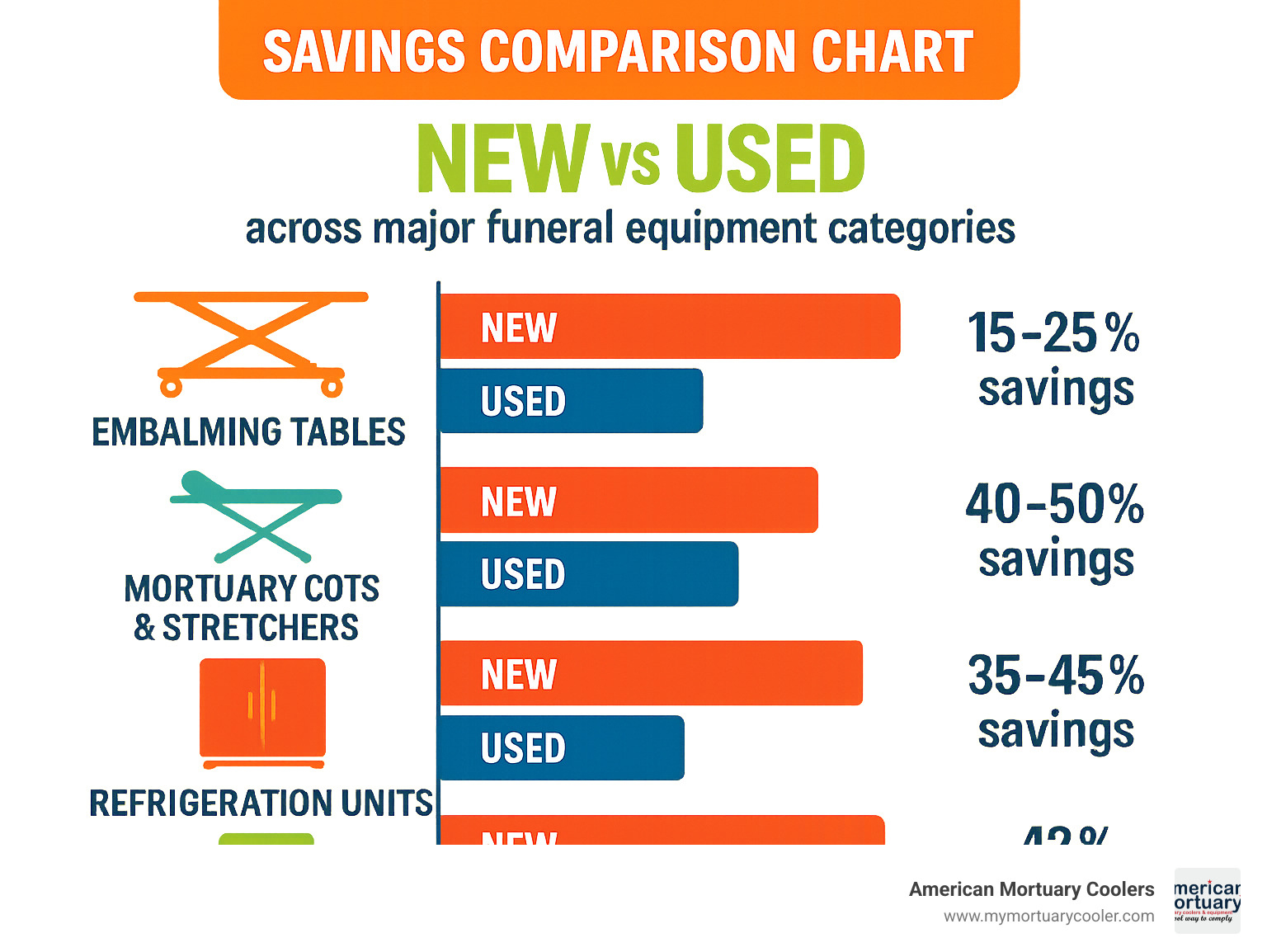
Who's Buying?
The used funeral equipment market serves a fascinating mix of buyers, each with their own unique needs and budget considerations.
Startup funeral homes make up a huge portion of the market, and it makes perfect sense. When you're launching a new operation, every dollar counts. These new operators often dedicate 60-70% of their equipment budget to used purchases, allowing them to offer comprehensive services while keeping their cash flow manageable during those crucial early months.
Rural funeral homes represent another major buyer segment. Smaller communities often work with tighter budgets, and the used market lets them maintain modern equipment standards without the pricing pressure that urban markets face. I've worked with rural directors who've built entire prep rooms using quality used equipment for less than the cost of two new embalming tables.
Mortuary science schools create steady demand because they need functional equipment for hands-on training. Students don't need the latest bells and whistles - they need reliable equipment that teaches proper techniques. Used funeral equipment fits this need perfectly while keeping educational costs reasonable.
International buyers might surprise you, but they're becoming increasingly common. Funeral directors in developing markets often find that American-made used equipment exceeds the quality of new equipment available locally, all while staying within their budget constraints.
Film and television production companies create an unexpected but steady demand stream. They need authentic mortuary equipment for realistic sets, and older models often work perfectly for their purposes while costing a fraction of new equipment.
Where to Find Reliable Used Funeral Equipment
Successful used funeral equipment sourcing requires knowing where to look and how to evaluate sellers. We've identified the most productive channels based on years of market observation.
Top Online Hubs
eBay Storefronts: Mortuary Supplies for sale – eBay offers the largest selection of used mortuary equipment. Search specifically for "mortuary" rather than "funeral" to uncover hidden listings. Seller ratings and return policies provide transaction security.
Facebook Groups: Private industry groups like "Funeral Directors Buy/Sell/Trade" connect buyers directly with sellers. These communities offer insider knowledge about equipment history and seller reputation.
Machinio: This industrial equipment marketplace specializes in heavy machinery, including mortuary refrigeration units and hydraulic systems. Professional sellers often provide detailed specifications and shipping arrangements.
Industry Forums: Websites serving funeral professionals frequently include classified sections where members list equipment for sale. These platforms benefit from community vetting and professional relationships.
Offline & Networking Channels
State Funeral Director Associations: Local associations maintain bulletin boards and networking events where members share equipment availability. These connections often yield the best deals through professional relationships.
NFDA BizExchange: The National Funeral Directors Association facilitates equipment exchanges during conferences and through online platforms. Members benefit from verified seller credentials and industry standards.
Estate Liquidators: When funeral homes close, liquidation companies handle equipment sales. These events offer bulk purchasing opportunities but require quick decision-making and immediate payment.
Trade Shows: Industry exhibitions provide opportunities to inspect used equipment in person and negotiate directly with sellers. Many dealers bring their best used inventory to these events.
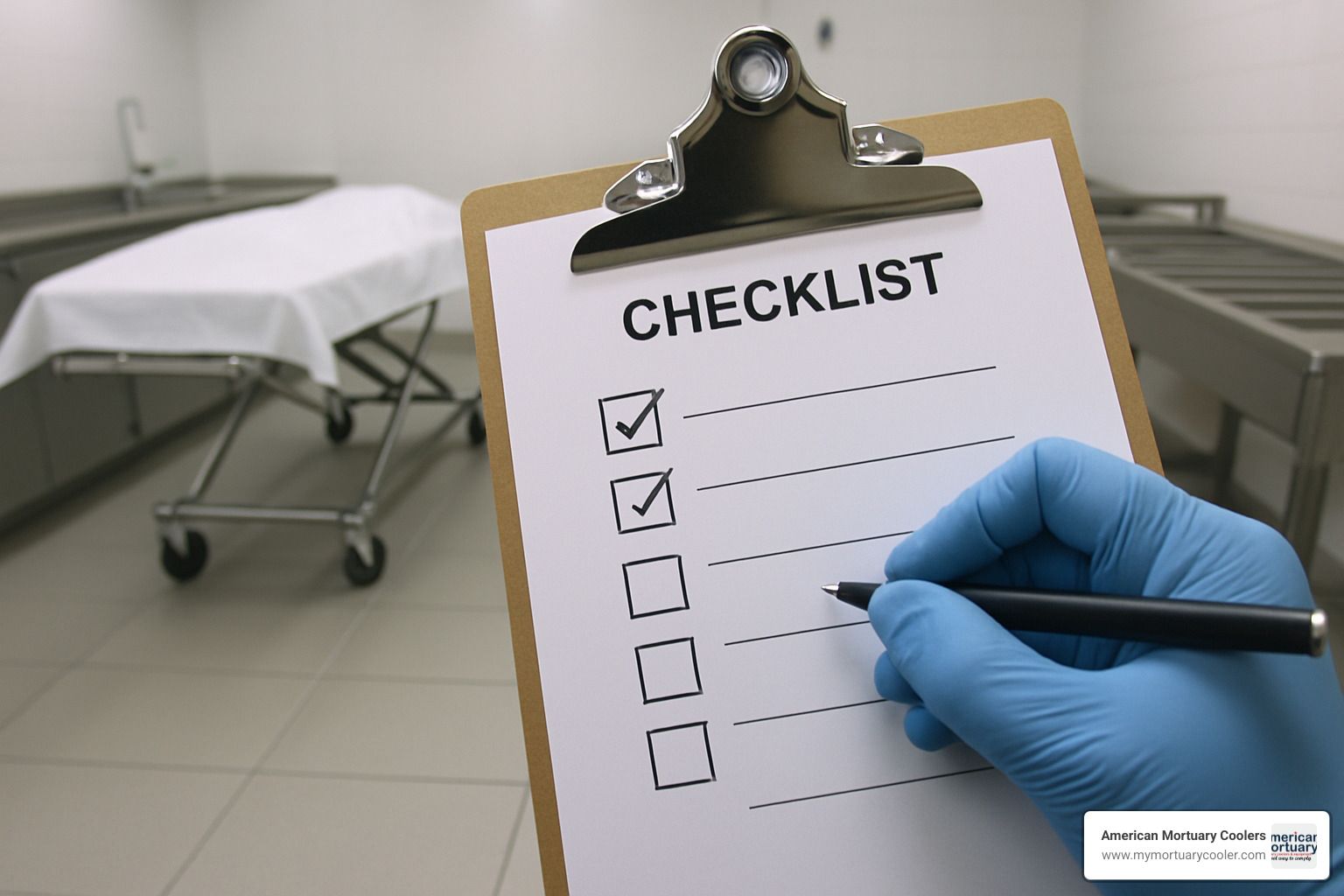
Inspecting & Verifying Quality, Safety, and Compliance
Thorough inspection separates successful used funeral equipment purchases from costly mistakes. We recommend a systematic approach covering structural, mechanical, and regulatory compliance factors.
Load Capacity Verification: Check manufacturer plates for weight ratings and inspect support structures for stress signs. Mortuary cots should handle 500-1,000 pounds, while embalming tables typically support 650-1,000 pounds. Test moving parts under load when possible.
304 Stainless Steel Confirmation: Look for grade markings on stainless steel components. Type 304 stainless steel provides superior corrosion resistance essential for mortuary environments. Inferior grades may appear similar but fail prematurely in chemical-rich environments.
Hydraulic System Testing: Operate all hydraulic functions multiple times, listening for unusual noises or jerky movements. Check for fluid leaks around cylinders, hoses, and connections. Smooth, quiet operation indicates proper maintenance and remaining service life.
Electrical Certification Review: Verify UL listings and electrical safety certifications. Test all electrical functions including motors, pumps, and control systems. Uncertified modifications or damaged wiring create safety hazards and compliance issues.
For mortuary refrigeration specifically, we've published detailed guidance at More info about coolers covering temperature consistency, insulation integrity, and compressor condition.
Red Flags When Inspecting Used Funeral Equipment
Structural Cracks: Hairline cracks in welds, frames, or support structures indicate stress failures that will worsen over time. We've seen buyers nearly purchase compromised equipment that would have failed during use.
Hydraulic Leaks: Any visible fluid leakage suggests seal failures requiring expensive repairs. Even minor leaks often indicate system-wide deterioration.
Missing Documentation: Equipment without original manuals, maintenance records, or proof of purchase may have unclear ownership or hidden problems. Legitimate sellers provide complete documentation.
Electrical Modifications: Non-standard wiring, bypassed safety switches, or missing electrical components suggest improper repairs that create safety risks.
Excessive Corrosion: While surface rust is cosmetic, deep corrosion affecting structural components compromises safety and longevity.
Legal & Regulatory Checklist
OSHA Compliance: All mortuary equipment must meet occupational safety standards. Verify that safety guards, emergency stops, and protective features remain intact and functional.
State Embalming Room Codes: Each state maintains specific requirements for embalming equipment. Confirm that used purchases meet local regulatory standards before installation.
EPA Disposal Rules: Equipment previously used with hazardous chemicals requires proper decontamination. Request certificates showing compliant cleaning and disposal procedures.
Warranty Transfer: Some manufacturers allow warranty transfers with proper documentation and fees. Contact manufacturers directly to understand transfer options and requirements.
Ensuring Sanitation & Bio-Safety
Professional Decontamination: All used funeral equipment should undergo professional cleaning before use. This process removes biological contaminants and chemical residues that standard cleaning cannot address.
Decontamination Certificates: Request written certification that equipment has been properly decontaminated according to industry standards. This documentation protects your facility and demonstrates due diligence.
Personal Protective Equipment: Always wear appropriate PPE when inspecting used equipment. Gloves, eye protection, and respiratory protection prevent exposure to unknown contaminants.
Documentation Requirements: Maintain records of all decontamination procedures, cleaning products used, and safety measures implemented. This documentation supports regulatory compliance and insurance requirements.
Buying vs. Selling: Financial, Legal & Environmental Angles
The used funeral equipment market creates wins for everyone involved. Buyers get quality equipment at reasonable prices, sellers recover capital from unused assets, and our environment benefits from extended product lifecycles. It's a cycle that makes both financial and environmental sense.
Smart money management starts with understanding how used equipment purchases affect your books. Unlike new equipment that must be depreciated over several years, used equipment purchases often qualify as immediate business expenses. This can provide significant tax advantages, especially for smaller funeral homes managing cash flow. Your accountant can help you time these purchases for maximum benefit.
The depreciation game works in your favor when buying used. Equipment loses value whether it sits in your prep room or someone else's warehouse. By purchasing used funeral equipment that's already past its steepest depreciation curve, you get years of reliable service while maintaining better value retention. It's like buying a three-year-old car instead of driving a new one off the lot.
Environmental stewardship has become increasingly important to funeral families and communities. When you choose used equipment, you're extending product lifecycles and reducing manufacturing demand. This circular economy approach resonates with families who value sustainability, giving your funeral home an additional talking point about responsible business practices.
For a deeper dive into market dynamics, check out our comprehensive analysis at From New to Used: Navigating Mortuary Equipment Options.
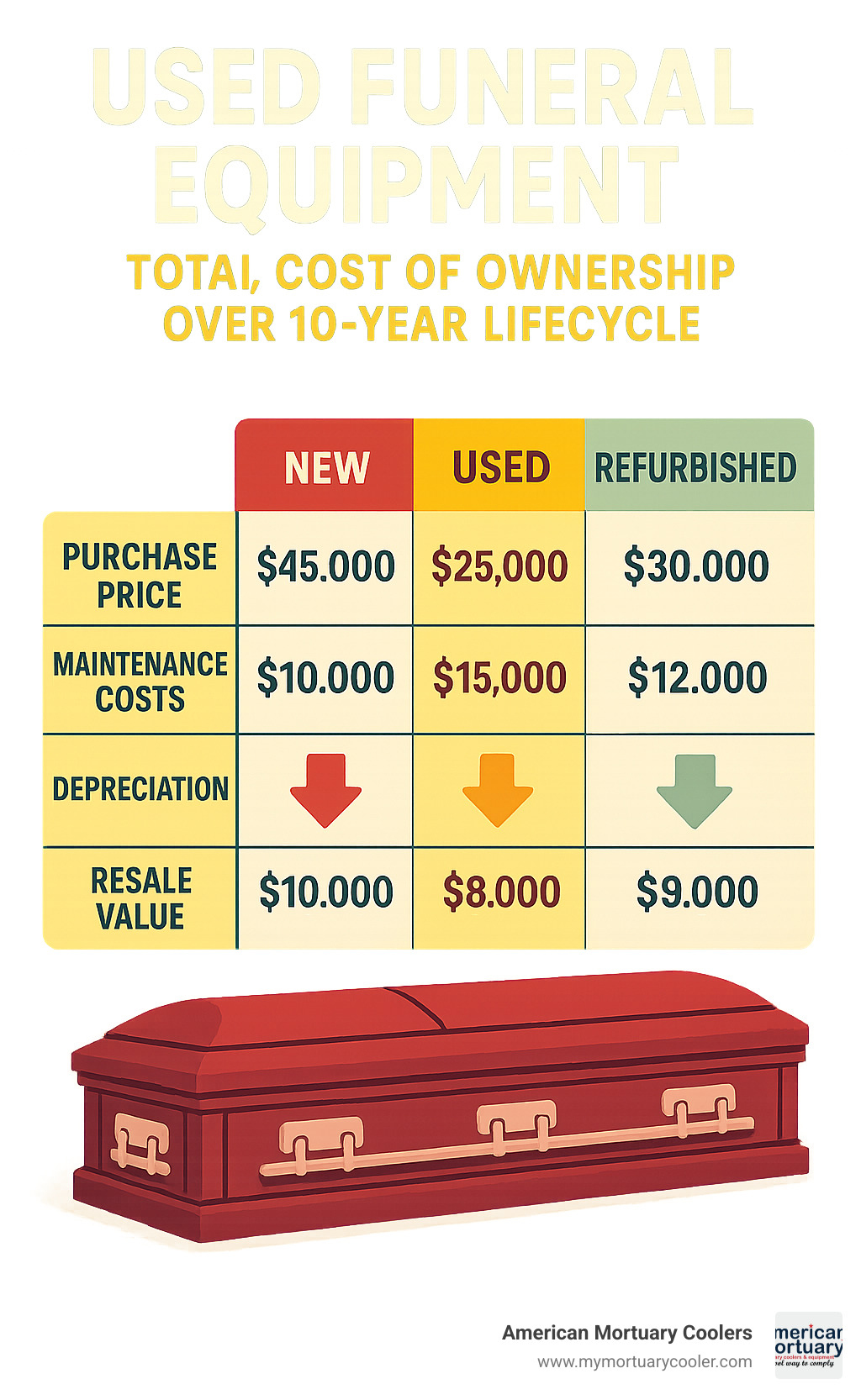
Financing & Payment Options for Used Funeral Equipment
Financing used equipment is often easier than you might expect. Several lenders specialize in funeral industry equipment loans and understand that quality used gear can serve your families just as well as new equipment. These industry-focused lenders offer custom terms that match your seasonal cash flows and business cycles.
SBA microloans provide excellent opportunities for used equipment purchases under $50,000. The Small Business Administration recognizes that used equipment can be just as valuable as new for small businesses. These programs often require less paperwork and offer more favorable terms than traditional commercial loans.
Many sellers understand that flexible payment arrangements help close deals faster. Seller financing works particularly well for higher-value items like refrigeration units or complete embalming room setups. The seller gets steady payments while you preserve working capital for other business needs.
Equipment leasing companies sometimes work with used equipment, especially if it's been refurbished or certified. This approach converts capital expenses to operating expenses, which can improve your balance sheet and preserve credit lines for other opportunities.
Established funeral homes can often leverage existing business credit relationships to finance used equipment purchases. Your banker already understands your business model and cash flows, making approval processes smoother and potentially securing better rates.
Best Practices for Selling Surplus Gear
Great photos sell equipment faster than any sales pitch. Take clear, well-lit pictures from multiple angles, including close-ups of control panels, manufacturer plates, and any wear areas. Buyers shopping online need to see exactly what they're getting. Don't hide problems - honest disclosure builds trust and prevents disputes later.
Complete maintenance records justify your asking price and give buyers confidence in their purchase. Include service receipts, routine maintenance logs, and any recent inspection reports. This documentation shows you've cared for the equipment properly and helps buyers understand what they're getting.
Research comparable sales before setting your price. Overpriced equipment sits on the market while underpriced items make buyers suspicious of hidden problems. Check recent eBay sold listings, industry forums, and dealer prices to establish fair market value.
Professional shipping arrangements protect both parties in large equipment sales. Mortuary refrigeration units and embalming tables require specialized handling and proper packaging. Partner with freight companies experienced in heavy equipment to ensure safe delivery and avoid damage claims.
Detailed bills of sale prevent misunderstandings and protect everyone involved. Document equipment specifications, condition disclosures, included accessories, and any warranty limitations. Clear paperwork makes transactions smoother and provides legal protection if issues arise later.
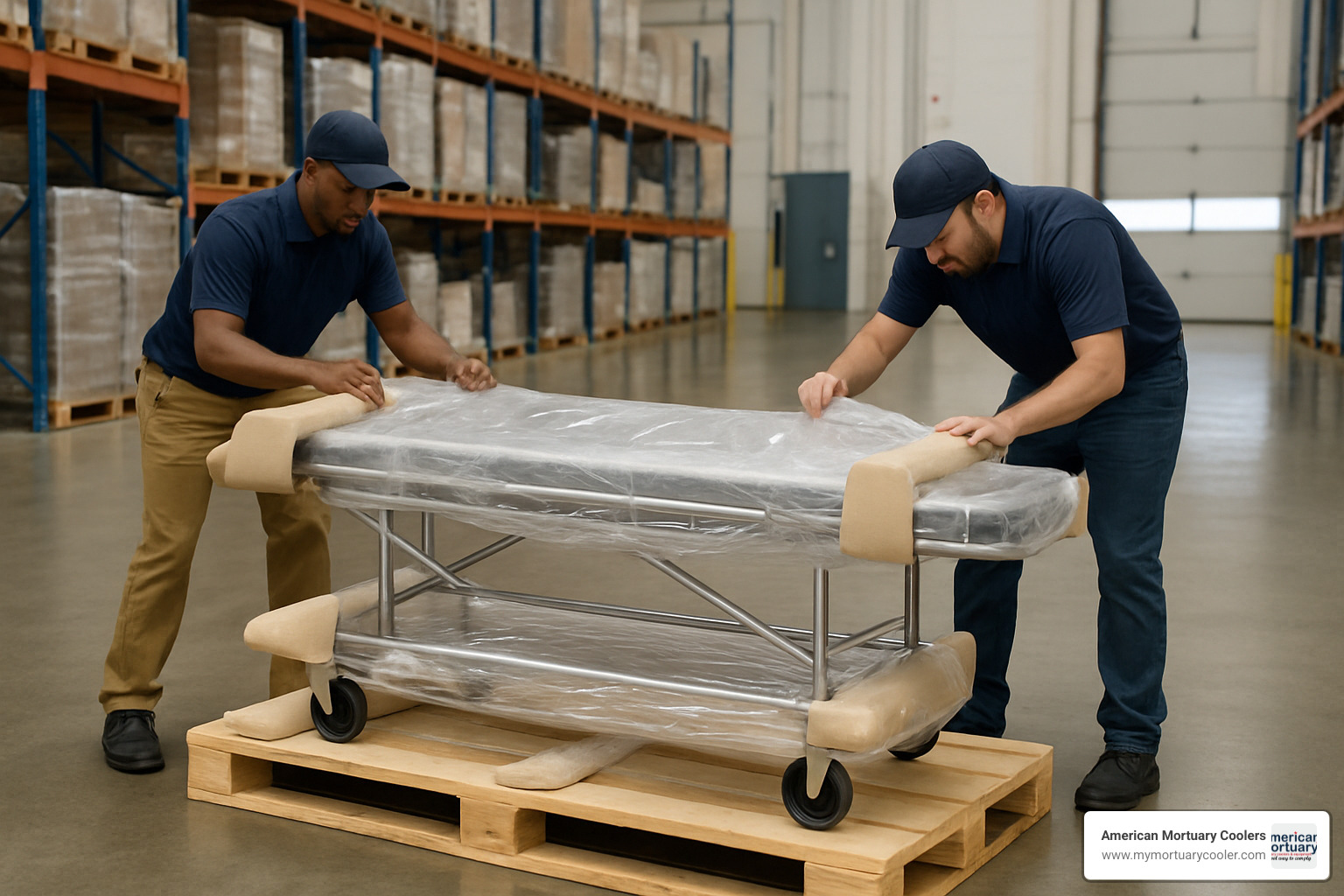
Frequently Asked Questions about Used Funeral Equipment
Buying used funeral equipment raises important questions about documentation, warranties, and legal considerations. After helping hundreds of funeral directors steer these waters, I've noticed the same concerns come up repeatedly. Let me share what I've learned from real-world transactions.
What documentation should I request before purchase?
Start with the basics: original equipment manuals, service records, and proof of purchase. These three documents tell the complete story of your potential investment.
Equipment manuals aren't just instruction booklets - they're your roadmap to safe operation and proper maintenance. Without them, you're flying blind on maintenance schedules, safety procedures, and troubleshooting steps. I've seen funeral directors struggle with equipment simply because they lacked the manual to understand proper operation.
Service records reveal everything about how well previous owners maintained the equipment. Look for regular maintenance intervals, major repairs, and any recurring issues. A well-maintained embalming table with complete service records often performs better than a newer unit with spotty maintenance history.
Proof of purchase confirms legitimate ownership and protects you from unknowingly buying stolen equipment. This documentation also becomes essential if you need warranty service or plan to resell the equipment later.
Don't overlook specialized paperwork like decontamination certificates, compliance inspections, and modification records. These documents demonstrate that the equipment meets safety standards and has been properly cleaned for your use.
Are warranties or service contracts transferable?
Here's where it gets interesting - warranty policies vary dramatically between manufacturers. Some companies welcome warranty transfers as a way to maintain customer relationships, while others void coverage the moment equipment changes hands.
The manufacturers that do allow transfers typically charge $100-$500 in transfer fees and require specific documentation. You'll need proof of purchase, serial numbers, and sometimes inspection reports. The process can take 2-4 weeks, so plan accordingly.
Third-party warranty companies have stepped in to fill this gap, offering coverage specifically for used equipment. These policies typically run 90 days to 2 years and cost 5-15% of the equipment's value. They're particularly valuable for complex equipment like refrigeration systems.
Many sellers offer their own 30-90 day guarantees covering major component failures. While not as comprehensive as manufacturer warranties, these seller guarantees provide peace of mind during the critical break-in period.
Service contracts sometimes transfer more easily than warranties, especially for refrigeration equipment requiring ongoing maintenance. Contact the manufacturer before purchase to understand their specific policies - it's worth the phone call.
Can I donate outdated equipment for a tax deduction?
Absolutely, and it's a win-win situation that many funeral directors overlook. Equipment donations support education while providing meaningful tax benefits for your business.
Mortuary science programs desperately need functional equipment for student training. Your outdated embalming table might be perfect for teaching proper techniques. International missions and underfunded coroner offices also welcome equipment donations that would otherwise sit unused.
IRS Form 8283 documents your charitable contribution, but donations over $5,000 require professional appraisals. The appraisal cost (typically $300-$800) is tax-deductible and often pays for itself through increased deduction value.
Timing matters for tax strategy. Donations made before December 31st count toward that tax year's deductions. Work with your accountant to determine optimal timing based on your income and tax situation.
The recipient organization must provide written acknowledgment including their tax-exempt status, donation date, and detailed equipment description. Keep this documentation with your tax records - the IRS requires it for deduction claims.
Consider the goodwill factor beyond tax benefits. Supporting education and underserved communities builds positive relationships within the funeral industry while extending your equipment's useful life.
Conclusion & Next Steps
Smart funeral directors have finded that the used funeral equipment market isn't just about saving money - it's about building sustainable, profitable operations that serve families well while protecting your bottom line. With consistent savings of 25-40% across everything from embalming tables to refrigeration units, used equipment purchases free up capital for other critical business needs.
The key to success lies in patience and preparation. Understanding how equipment depreciates over time helps you spot the sweet deals, while knowing where to look - from eBay storefronts to state association networks - puts you ahead of the competition. Most importantly, thorough inspections protect you from costly mistakes that could derail your savings.
Regulatory compliance never takes a holiday, whether you're buying new or used. OSHA standards, state embalming codes, and EPA requirements apply equally to all equipment. The good news? Following our inspection checklist and documentation requirements keeps you on the right side of regulations while securing quality equipment.
At American Mortuary Coolers, we've watched funeral directors transform their operations through smart equipment choices. Our custom mortuary cooling solutions work beautifully alongside used equipment, creating comprehensive facilities that deliver professional results without breaking budgets. We ship our Tennessee-crafted systems across all 48 contiguous states, ensuring you get the reliable refrigeration your families deserve.
The environmental benefits add another layer of value to your used equipment strategy. Every piece of equipment you rescue from the scrap heap reduces manufacturing demand and supports the circular economy. Your cost savings become part of a larger sustainability story that resonates with environmentally conscious families.
Future-proof your planning by viewing used equipment as one tool in your broader facility strategy. Some items - like our custom coolers - deserve new equipment investment for reliability and warranty protection. Others, like established hydraulic embalming tables, perform beautifully for decades when properly maintained.
Ready to dive deeper into the marketplace? Explore more used equipment insights for additional strategies and market intelligence that can sharpen your buying skills.
The used funeral equipment market rewards prepared buyers who understand value, quality, and compliance. Whether you're launching your first location or expanding existing operations, this marketplace offers genuine opportunities to build the facility your community needs within the budget reality you face.
Contact us today to discuss how our custom mortuary coolers can anchor your facility while you source other equipment through the used market. Together, we'll create a solution that serves families with dignity while keeping your business financially healthy.

















